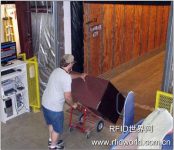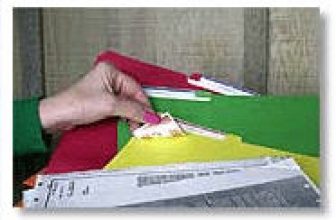
Furniture manufacturer Solid Comfort uses RFID to greatly reduce shipping errors
[ad_1]
Hotel furniture manufacturer Solid Comfort uses an RFID system to track furniture from assembly to delivery to customers. The system helped the company cut two full-time positions, reducing transportation errors and confusion about cargo delivery. This system is provided by AbeTech.
Solid Comfort uses an RFID system to solve two major problems. Ryan Larkin, the furniture manufacturer’s supervisor, said: After the furniture is integrated, it locates the location of each piece of furniture (including headboards, headboards, Mirrors and tables, etc.); track the time and place where the order goods are shipped to ensure the completeness and accuracy of the order. In the past, Solid Comfort hired two full-time employees to manage this type of information. One person checks back and forth between the warehouse and the production area, tracking the corresponding goods of each order, and the storage location. Another employee monitors the truck loading process to ensure that the correct quantity of the correct cargo is loaded on the correct vehicle.

In the warehouse of Solid Comfort, the staff pushes the goods through an RFID entrance and exit
Even if there is a dedicated person in charge, Larkin said, the incident will still go wrong. If hotels often claim that the quantity of goods received is incorrect, request Solid Comfort to replenish the missing goods. Sometimes, manufacturers have to produce more goods for later use. “This means that sometimes we have to spend 500 US dollars to replace 200 US dollars of goods,” he explained, and sometimes after the supplementary goods arrive, the hotel finds furniture that was thought to be missing.
To this end, in 2009, Solid Comfort began to cooperate with AbeTech to develop a set of solutions. The company implemented the application in two phases, Larkin said. The first phase was implemented at the end of last year. Tags were installed on finished furniture products to track finished furniture products waiting to be shipped in the warehouse. When receiving a hotel order, the employee enters the information into AbeTech’s customized software (running on the back-end server). This information includes the name of the company that placed the order, and the time and date the order was placed.
After the furniture assembly of an order is completed, the worker uses a Zebra Technologies RFID printing and encoding machine to write an ID code on an adhesive label containing EPC Gen 2 passive UHF tags, and then print it on the front of the label The same ID code and order information. The tag ID code is stored in the back-end software and corresponds to the room information and the number of floors where the furniture is placed. Employees can write their personal ID codes on each label.
When the furniture is transported from the production area to the warehouse on wheel pallets, it passes through an exit door containing an Alien Technology reader connected to a back-end server. The reader reads the unique ID code of each label. The AbeTech software compiles the ID code and corresponds it to the order number. When the furniture is sent to the warehouse, its status is updated, AbeTech director Eric Soderholm explained. A 24-inch monitor connected by wire flashes green every time the tag is read at the entrance and exit.
Currently, employees label 5,000-7,000 pieces of furniture every month.
According to Larkin, in the first stage of the application, the company can view the progress of the order and understand the time it takes to complete the order. If the customer requests an order progress report, AbeTech’s system can immediately show whether the order is complete-if not, how many items need to be integrated.
Larkin was satisfied with the first stage, and the company embarked on the second stage-the use of RFID to track the process of loading products on trucks. AbeTech installed an Alien reader at the entrance and exit of each loading dock to capture the ID code of each item. The AbeTech software knows which door each piece of furniture should pass through based on the truck loaded with the cargo and its destination. If items destined for Minneapolis are loaded onto a vehicle destined for Fargo, the warehouse’s 24-inch monitor will display an error alert and notify employees to correct it in time.
When the loading is complete, Solid Comfort generates an electronic record indicating which item was placed on which truck to ensure the integrity and accuracy of the order.
When the truck arrived at the hotel, the hotel staff began to unload the furniture, using the printed text information of the RFID tag to identify the item. If there is damaged goods or wrong goods, the hotel staff can call Solid Comfort and provide the ID code of the RFID tag of the item. In this way, Solid Comfort can easily understand the specific furniture and the region.
The whole system has been in operation for 6 months. Larkin said that it has greatly improved the accuracy of the company’s cargo transportation, the company has also eliminated two full-time jobs, and customer satisfaction has improved. He believes that the company has recovered its return on investment.
[ad_2]




